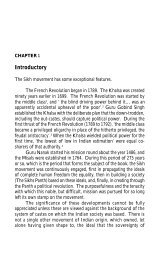Fundamentalism and the Sikh Religious Tradition by T.N. Madan
Fundamentalism and the Sikh Religious Tradition by T.N. Madan
Fundamentalism and the Sikh Religious Tradition by T.N. Madan
Create successful ePaper yourself
Turn your PDF publications into a flip-book with our unique Google optimized e-Paper software.
advantages or disadvantages of Punjabi Suba. Every <strong>Sikh</strong> considered <strong>the</strong> denial as<br />
discrimination. I fur<strong>the</strong>r enquired from Mr. Shastri, whe<strong>the</strong>r I had not expressed <strong>the</strong> same<br />
opinion to him <strong>and</strong> his answer was in <strong>the</strong> affirmative. I myself offered lo confront Mr.<br />
N<strong>and</strong>a <strong>by</strong> immediately rushing to Mr. Shastri's residence, but he said <strong>the</strong>re was no need.<br />
This disillusioned me. The intention of <strong>the</strong> Govt. <strong>the</strong>n was to use me against my<br />
community, secure an adverse report, <strong>and</strong> <strong>the</strong>n reject <strong>the</strong> dem<strong>and</strong>."<br />
"The Govt. has never seen merit in any <strong>Sikh</strong> dem<strong>and</strong>. The Das Commission in<br />
1948 recommended postponement of reorganisation on <strong>the</strong> plea, inter alia, that if once<br />
begun in <strong>the</strong> South, it might intensify <strong>the</strong> dem<strong>and</strong> <strong>by</strong> <strong>Sikh</strong>s in <strong>the</strong> North. The J.V.P.<br />
Committee (Jawaharlal, Vallabhbhai Patel <strong>and</strong> Pattabhi Sitaramayya) when reviewing <strong>the</strong><br />
Das report gratuitously remarked that no question of rectification of boundaries in <strong>the</strong><br />
provinces of Nor<strong>the</strong>rn India should be raised at <strong>the</strong> present moment, whatever <strong>the</strong> merit<br />
of such a proposal might be."<br />
"And this became <strong>the</strong> future policy. Nehru stuck to it. Shastri continued <strong>the</strong><br />
same, <strong>and</strong> Indira G<strong>and</strong>hi has made no departure."<br />
"Every effort was made <strong>by</strong> Mrs. G<strong>and</strong>hi, Mr. Shastri, <strong>and</strong> Mr. N<strong>and</strong>a to stop me<br />
from making my report."<br />
"Why <strong>the</strong> government had been so strongly against <strong>the</strong> parliamentary committee<br />
making a report in favour of Punjabi Suba <strong>and</strong> why Mrs. G<strong>and</strong>hi had felt bo<strong>the</strong>red <strong>and</strong><br />
ran about seeing everybody to stop Hukam Singh," has been explained <strong>by</strong> Mrs. G<strong>and</strong>hi<br />
herself. "The Congress found itself in a dilemma, to concede <strong>the</strong> Akali dem<strong>and</strong> would<br />
mean ab<strong>and</strong>oning a position to which it was firmly committed <strong>and</strong> letting down its Hindu<br />
supporters in <strong>the</strong> Punjabi Suba (p.117, My Truth)." The government has always been<br />
very particular about not "letting down its Hindu supporters." The Congress could not<br />
depend upon <strong>Sikh</strong> voters <strong>and</strong> out of political considerations could not suffer losing Hindu<br />
votes also. Therefore <strong>the</strong> Congress failed to do justice to <strong>the</strong> <strong>Sikh</strong>s."<br />
"The first schedule of <strong>the</strong> Regional Committee Order 1957 contained Ropar,<br />
Morinda <strong>and</strong><br />
Ch<strong>and</strong>igarh Assembly constituencies in Ambala district in <strong>the</strong> Punjabi region."<br />
"The subsequent reference to Shah Commission was loaded heavily against<br />
Punjab.<br />
Making <strong>the</strong> 1961 census as <strong>the</strong> basis <strong>and</strong> <strong>the</strong> tehsil as <strong>the</strong> unit was a deliberate design to<br />
punish <strong>the</strong> <strong>Sikh</strong>s. The language returns in <strong>the</strong> 1961 census were on communal lines.<br />
Therefore, <strong>the</strong> demarcation had to be on a communal ra<strong>the</strong>r than on a linguistic<br />
basis."<br />
"Consequently merit was again ignored <strong>and</strong> justice denied. Naturally tensions<br />
between <strong>the</strong> two communities increased. If <strong>the</strong> Sachar Formula, worked out in 1949 had<br />
been accepted, <strong>the</strong>re would not have been any fur<strong>the</strong>r conflict. If <strong>the</strong> Regional Formula<br />
had been allowed to be implemented, <strong>the</strong>re would not have been any fur<strong>the</strong>r discontent.<br />
And if Punjabi Suba had been demarcated simply on a linguistic basis, <strong>and</strong> not on false<br />
returns in 1961, <strong>the</strong>re would not have been any extremist movement."<br />
It clearly shows that <strong>the</strong> dem<strong>and</strong> for a linguistic state, a policy which was an old<br />
one with <strong>the</strong> Congress, <strong>and</strong> which had been implemented in <strong>the</strong> rest of India, was to be<br />
denied in <strong>the</strong> Punjab, because <strong>Sikh</strong>s would become a majority <strong>the</strong>re, <strong>and</strong> come in power<br />
under <strong>the</strong> democratic process.
















